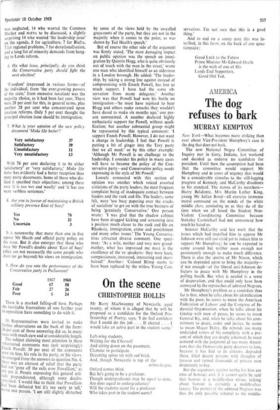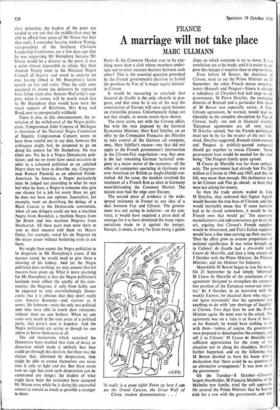The dog refuses to bark
AMERICA MURRAY KEMPTON
New York—What becomes more striking than ever about Vice-President Humphrey's case is the dog that does not bark.
The new National Negro Committee of Inquiry met in Gary, Indiana, last weekend and decided to endorse no candidate for president. Until then the assumption had been that the committee would support Mr Humphrey and in tones of urgency that would be a considerable stimulus to the still-lagging progress of Kennedy and McCarthy dissidents to his standard. The names of its members— Harry Belafonte, Mrs Martin Luther King, young Mr Julian Bond—all exercise immense moral command on the minds of the white middle class, reminding us as they do of the time when we all loved the Student Non- Violent Coordinating Committee because Stokeley Carmichael had not announced how much he hated us.
Senator McCarthy said last week that the issues which had impelled him to oppose Mr Johnson were still too vivid yet to induce him to support Mr Humphrey; he can be expected to come around but neither soon enough nor passionately enough to make much difference. There is also the spectre of Mr Nixon, which can be depended upon to bring the majority— if not enough—of the liberal anti-Johnson de- fectors to peace with Mr Humphrey in the polling booth. But what is needed is a sense of desperation, and that could only have been conveyed by the reproaches of admired Negroes.
Mr Humphrey's problem as a candidate thus far is that, when he talks about his identification with the poor, he seems to mean the American Federation of Labour and the Congress of In- dustrial Organisation, when he talks about his kinship with men of peace, he seems to mean General Ky, and, when he talks about his com- mitment to peace, order and justice, he seems to mean Mayor Daley. He reminds too many undecided voters of his complicity with a pre- sent of which they are deeply ashamed; he must contend with the judgment of too many Ameri- cans that the Democratic party deserves to lose, because it has lied to its citizens, degraded them, filled decent persons with thoughts of treason and turned thousands of private men desperately to bay.
But the arguments against voting for him are ones of honour; and, if it cannot quite be said that honour is a middle-class virtue, talking about honour is certainly a middle-class luxury. The protest of the admired Negroes was thus the only possible rebuttal to the middle- class defection; the leaders of the poor are needed to cry out that the middle-class may be able to afford four years of Mr Nixon but that they can't. I remember hearing Andrew Young, vice-president of the Southern Christian Leadership Conference, say a few days ago that he was supporting Mr Humphrey because Mr Nixon would be a disaster to the poor; it was a point almost impossible to refute. But then Andrew Young went to the National Negro Council of Inquiry and voted to endorse no one, having jibbed at Mr Humphrey's latest speech on law and order. Thus the only ones equipped to shame the defectors by reproach have fallen silent also. Senator McCarthy's sup- port, when it comes, will be worth much less to Mr Humphrey than would have been the vocal support of Belafonte, Mrs King and Bond, now so unexpectedly withheld.
There is also, in this announcement, the re- velation of the withdrawal of the Negro politi- cians. Congressman John Conyers of Michigan is chairman of the National Negro Committee of Inquiry. Congressman Conyers seems to have been careful not to say that, however his colleagues might feel, he proposed to go on doing his utmost for Mr Humphrey. He was silent too. Yet he is a Negro Democratic poli- tician; and we no more have usual occasion to refer to a coloured politician as an admired Negro than we have to describe, say, Congress- man Roman Pucinski as an admired Polish- American. In America, a Negro particularly must be judged not according to what he says but what he does; a Negro is someone who gets one chance for a job for every three we get; he does not have our options. Journalists, for example, went on describing the doings of a Black Caucus at the Democratic convention, when all one delegate could see was a machine Negro from Brooklyn, a machine Negro from the Bronx and two machine Negroes from Manhattan. All these poor men were there to vote as their masters told them to; Mayor Daley, for example, voted his six Negroes on the major issues without bothering even to ask them.
We might then expect the Negro politician to be desperate in Mr Humphrey's cause; if his masters cared, he would need to give them a showing of his kidney. And yet the Negro politician does nothing; we may assume that his masters have given up. What is more alarming for Mr Humphrey is that the Negro politician's lassitude must reflect the apathy of his com- munity; the Negroes, if only from habit, can be expected to vote overwhelmingly Demo- cratic; but it is obvious that they don't really care. Senator Kennedy—and, curious as it seems, Mr Johnson—were the only two political men who were able to touch their emotions; without them no one bothers. When no one cares very much in the core areas of a political party, that party's case is hopeless. And the Negro politicians are acting as though no one above or below them cares at all.
The old institutions which sustained the Democrats have reached that state of decay or distortion which made it unlikely that they could get through this election; but there was the chance that, informed by desperation, they might be able to arouse themselves one more time if only to fight and die. But there exists now no sign that even such desperation can be summoned any longer; the leaders of what might have been the resistance have accepted Mr Nixon even while he is doing his successful utmost to remain as much as possible a stranger to them.







































 Previous page
Previous page